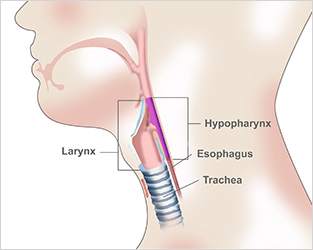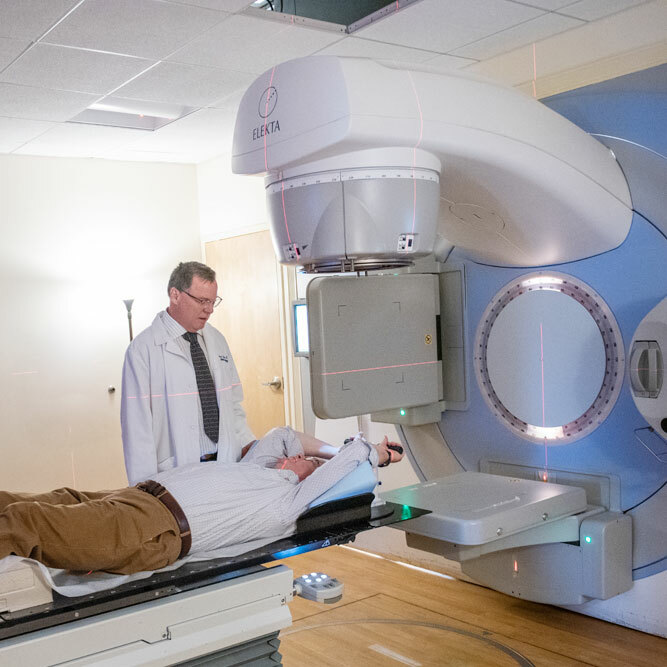
The hypopharynx is the bottom part of the throat, just behind the voice box (larynx). The larynx is a hollow tube about 5 inches long that allows air and food to pass to the trachea or esophagus. It starts behind the nose, goes down the neck, and ends at the top of the trachea (windpipe) and esophagus (the tube that goes from the throat to the stomach). The hypopharynx is divided into three regions: the posterior pharyngeal wall, the piriform sinuses, and the postcricoid region.
Hypopharyngeal cancer, a type of head and neck cancer, is a disease in which malignant (cancer) cells form in the tissues of the hypopharynx. Most hypopharyngeal cancers are squamous cells meaning they started in the thin, flat cells lining the inside of the hypopharynx.
Learn more below about what to look for and what types of treatments are available for hypopharyngeal cancer.

Doctors use a variety of tests, procedures, and scans to examine the throat and neck in order to detect and diagnose hypopharyngeal cancer.

Once cancer has been confirmed, and tests are completed to determine if it’s spread outside of the primary area, a stage is given.

The treatments used for each patient with hypopharyngeal cancer depend on the stage and the patient’s overall health condition.
Some behaviors increase your risk of developing certain cancers. And in other cases, your risk goes up simply because of your age or race. For many patients there are several risk factors present. However, having a risk factor (or a few) does not guarantee you will get cancer. On the other hand, some patients develop cancer with no risk factors present.
Understanding some of the risk factors that you can control would lower the likelihood of developing that type of cancer. Risk factors for hypopharyngeal cancer include those you can control and those you cannot.
Smoking and/or chewing tobacco
Frequent and/or heavy alcohol consumption
Eating a diet lacking in nutrients
Human papillomavirus (HPV) infection
Exposure to certain environmental or occupational fumes and chemicals over long periods of time
Untreated gastroesophageal reflux disease (GERD)
Age (people over 55 are at higher risk)
Race (more common among African Americans and Caucasians)
Gender (more common in men than women)
Genetic syndromes (inherited gene mutations)
Having Plummer-Vinson syndrome (a disorder that involves iron deficiency and causes difficulty swallowing)
These signs and symptoms may be caused by hypopharyngeal cancer or by other conditions. You shouldn’t assume that you have cancer if you experience the following. However, you should see your doctor if the symptom doesn’t resolve itself within a week or so.
A persistent sore throat and/or cough not caused by COVID-19 or the flu
Ear pain not caused by an ear infection or other condition
A lump in the neck
A change in voice
Pain or difficulty when swallowing
Chronic bad breath
Difficulty breathing
If it is cancer, the sooner it is detected, the better chance for positive treatment results.

Quickly and efficiently build the materials you need to support your inbound marketing strategy. Drag and drop building blocks including testimonials, forms, calls-to-action, and more.